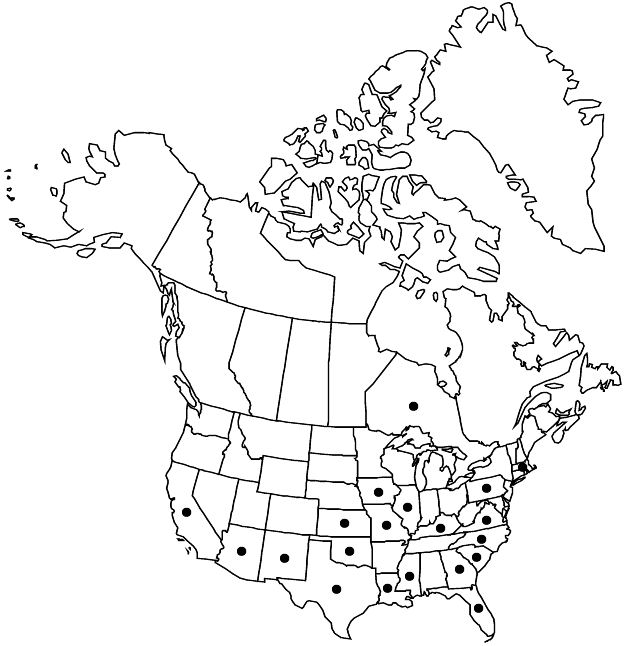Difference between revisions of "Anoda cristata"
Linnaea 11: 210. 1837.
FNA>Volume Importer |
imported>Volume Importer |
||
| (6 intermediate revisions by 2 users not shown) | |||
| Line 12: | Line 12: | ||
|label=Weedy | |label=Weedy | ||
}} | }} | ||
| − | |basionyms={{Treatment/ID/ | + | |basionyms={{Treatment/ID/Basionym |
|name=Sida cristata | |name=Sida cristata | ||
|authority=Linnaeus | |authority=Linnaeus | ||
| + | |rank=species | ||
| + | |publication_title=Sp. Pl. | ||
| + | |publication_place=2: 685. 1753 | ||
}} | }} | ||
|synonyms={{Treatment/ID/Synonym | |synonyms={{Treatment/ID/Synonym | ||
|name=Anoda arizonica | |name=Anoda arizonica | ||
|authority=A. Gray | |authority=A. Gray | ||
| − | }}{{Treatment/ID/Synonym | + | |rank=species |
| + | }} {{Treatment/ID/Synonym | ||
|name=A. hastata | |name=A. hastata | ||
|authority=Cavanilles | |authority=Cavanilles | ||
| − | }}{{Treatment/ID/Synonym | + | |rank=species |
| + | }} {{Treatment/ID/Synonym | ||
|name=A. triangularis | |name=A. triangularis | ||
|authority=(Willdenow) de Candolle | |authority=(Willdenow) de Candolle | ||
| + | |rank=species | ||
}} | }} | ||
|hierarchy=Malvaceae;Malvaceae subfam. Malvoideae;Anoda;Anoda cristata | |hierarchy=Malvaceae;Malvaceae subfam. Malvoideae;Anoda;Anoda cristata | ||
| Line 40: | Line 46: | ||
|elevation=0–2300 m | |elevation=0–2300 m | ||
|distribution=Ont.;Ariz.;Calif.;Fla.;Ga.;Ill.;Iowa;Kans.;Ky.;La.;Mass.;Miss.;Mo.;N.Mex.;N.C.;Okla.;Pa.;S.C.;Tex.;Va.;Mexico;West Indies;Central America;South America;introduced in Australia. | |distribution=Ont.;Ariz.;Calif.;Fla.;Ga.;Ill.;Iowa;Kans.;Ky.;La.;Mass.;Miss.;Mo.;N.Mex.;N.C.;Okla.;Pa.;S.C.;Tex.;Va.;Mexico;West Indies;Central America;South America;introduced in Australia. | ||
| − | |discussion=<p>Anoda cristata appears to be increasing its range in North America and elsewhere. It is quite variable, with either a decumbent to suberect habit and with varied flower sizes. The weedy form has generally small flowers while those to the south in Mexico have showy larger flowers even used in floral arrangements.</p> | + | |discussion=<p><i>Anoda cristata</i> appears to be increasing its range in North America and elsewhere. It is quite variable, with either a decumbent to suberect habit and with varied flower sizes. The weedy form has generally small flowers while those to the south in Mexico have showy larger flowers even used in floral arrangements.</p> |
|tables= | |tables= | ||
|references= | |references= | ||
| Line 49: | Line 55: | ||
-->{{#Taxon: | -->{{#Taxon: | ||
name=Anoda cristata | name=Anoda cristata | ||
| − | |||
|authority=(Linnaeus) Schlechtendal | |authority=(Linnaeus) Schlechtendal | ||
|rank=species | |rank=species | ||
| Line 64: | Line 69: | ||
|publication year=1837 | |publication year=1837 | ||
|special status=Weedy | |special status=Weedy | ||
| − | |source xml=https:// | + | |source xml=https://bitbucket.org/aafc-mbb/fna-data-curation/src/2e0870ddd59836b60bcf96646a41e87ea5a5943a/coarse_grained_fna_xml/V6/V6_419.xml |
|subfamily=Malvaceae subfam. Malvoideae | |subfamily=Malvaceae subfam. Malvoideae | ||
|genus=Anoda | |genus=Anoda | ||
Latest revision as of 22:21, 5 November 2020
Herbs, to 1 m, usually much shorter (quite variable). Stems suberect to decumbent, with patent or retrorse, simple hairs, hairs 1 mm. Leaves: petiole 1/2 times to equaling blade, hispid; blade concolorous, often with purple blotch along midvein, ovate, triangular, hastate, or sometimes palmately lobed, mostly 3–9 cm, membranous, base cordate, wide-rounded, or truncate, margins crenate to subentire, apex acute, surfaces sparsely hairy, hairs mostly simple, appressed, 1 mm. Inflorescences solitary flowers. Pedicels 4–12 cm, often exceeding leaf. Flowers: calyx 5–10 mm, accrescent to 12–20 mm, lobes without dark midrib, apex acute, hispid; petals purplish or lavender, rarely white, drying purplish, sometimes bluish, 8–26(–30) mm; staminal column hairy; style 10–19-branched; stigmas glabrous. Schizocarps 8–11 mm diam. (excluding spines), densely hispid; mericarps 10–19, with dorsal spur 1.5–4 mm. Seeds with or without enclosing endocarp. 2n = 30, 60, 90.
Phenology: Flowering summer–fall.
Habitat: Usually weedy in disturbed areas, fence rows, agricultural fields
Elevation: 0–2300 m
Distribution

Ont., Ariz., Calif., Fla., Ga., Ill., Iowa, Kans., Ky., La., Mass., Miss., Mo., N.Mex., N.C., Okla., Pa., S.C., Tex., Va., Mexico, West Indies, Central America, South America, introduced in Australia.
Discussion
Anoda cristata appears to be increasing its range in North America and elsewhere. It is quite variable, with either a decumbent to suberect habit and with varied flower sizes. The weedy form has generally small flowers while those to the south in Mexico have showy larger flowers even used in floral arrangements.
Selected References
None.